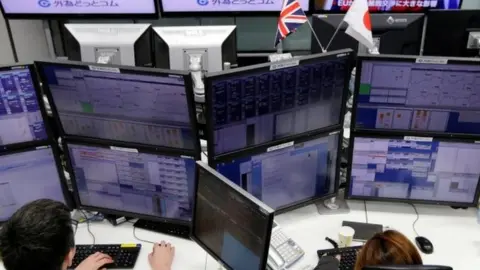Election catches investors off guard
 Reuters
ReutersUncertainty - we'll be hearing a lot more of that word over the next few days.
Uncertainty over the form the next government will take.
Uncertainty over the Brexit process and the country's approach to it, and our largest trading partner, the European Union.
Uncertainty over the economic policies the country will follow - a Conservative-led or Labour-led mix which are very different propositions.
And whether there might, ultimately, be another election.
The problem is, whatever the political uncertainties over the next few weeks and months, a few things are certain.
Real incomes are falling.
Growth has slowed.
Prices are going up.
While politicians face the mother of all negotiation headaches - domestically and with the European Union - the economy stutters on.
And all the economic issues that the country faced on June 8, are all still here on June 9.
Pound drops
When the general election exit poll was revealed at 10pm last night, the pound immediately dropped by 2% as investors took a position that a hung parliament was a possible outcome of the general election.
Why would that lead the currency to decline in value?
Because a hung parliament means that the government's direction of travel is less clear.
Deals with different parties may need to be done - each with very different outcomes.
Nervousness in the markets is likely to increase and investors in charge of large amounts of global capital could decide to move their money to more attractive markets, such as the Eurozone where growth has picked up and political risk (the major Dutch and French elections are behind us for example) has reduced.
Economic challenges
In any election, investors would rather a large majority, for either the Conservatives or for Labour.
Because that means the threat of another dislocating general election recedes.
And the direction of travel for the economy becomes more certain.
Strong and stable as some might describe it.
We are a long way from that scenario, and from being clear on the policies any new government will propose to solve the myriad economic challenges the UK faces.
And whilst we are in that position, downward pressure on sterling will continue, even if there is now a greater chance of a "softer" Brexit which many investors might welcome.
